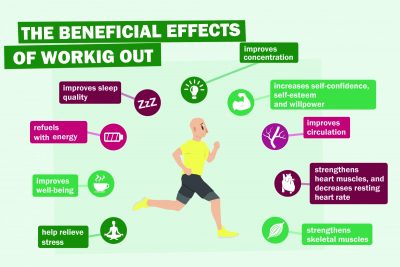 Exercise – a secret to a long life
Exercise – a secret to a long life
People of the modern age spend their time less actively. Our everyday activities (commuting, work, entertainment, meeting friends, household chores) have been simplified, automated, or moved to the online space due to the development of various devices and technological tools. Therefore we tend to exercise less, which has a negative effect on our health status, increasing the risk of diabetes, certain tumors, depression, dementia, and cardiovascular diseases.
We can make small adjustments to our daily routine to increase the amount of physical exercise; we can walk or cycle instead of driving or using public transport, and we can take the stairs instead of the elevator. During work, it is recommended to take 5–10-minute breaks for walks and brief exercises. We should look for sporting opportunities and communities near our home, and involve family members and friends in organized programs like hiking, playing football, table tennis, or badminton.
Regular exercise also serves a pivotal role in disease prevention. It improves circulatory system function, strengthens cardiac muscles, and decreases the resting heart rate. Doing sports bolsters the skeletal muscles and increases muscular strength. Since regular physical exercise burns a considerable amount of calories, it is a great method for reaching and maintaining our ideal weight. Doing sports may also help us to relieve stress, and improve our sense of well-being, while providing us with more energy, making our days calmer and more balanced. It also enhances sleep quality and our ability to concentrate, increases self-confidence and self-esteem, bolsters willpower, and has a positive effect on our performance in all fields of life.

How much should we exercise in a week?
How much time should we devote to physical exercise on a weekly basis? According to the official recommendation, we need at least 150 minutes of moderate-intensity aerobic exercise, or 75 minutes of vigorous physical activity (alternatively, it could be a combination of the two). However, doubling the recommended amount and incorporating strength exercises twice per week may have further benefits.
Paying attention to our heart rate
 The intensity of physical exercise can also be determined by using a heart rate zone calculator. Paying attention to our heart rate is important since we cannot reach the desired results if our heart rate does not increase sufficiently during the exercise. An excessively high heart rate may also be problematic since it overstrains our body and our circulatory system. Exercising consistently with an excessive heart rate may lead to circulatory problems.
The intensity of physical exercise can also be determined by using a heart rate zone calculator. Paying attention to our heart rate is important since we cannot reach the desired results if our heart rate does not increase sufficiently during the exercise. An excessively high heart rate may also be problematic since it overstrains our body and our circulatory system. Exercising consistently with an excessive heart rate may lead to circulatory problems.
Physical exercise (similarly to being on a diet) does not guarantee results overnight. While drastic diets potentially result in a yo-yo effect, a sudden increase in exercise may lead to overtraining, injuries, joint pain, and a weakened immune system. We need to devise a personalized exercise plan with gradually increasing physical strain, and the appropriate amount of rest. If we have locomotor issues that cause difficulties and pain during everyday activities, we need to consult our GP, physiotherapist, or other health professionals before engaging in sports activities.
Photo: Canva
Graphics: Egészségfejlesztési Központ